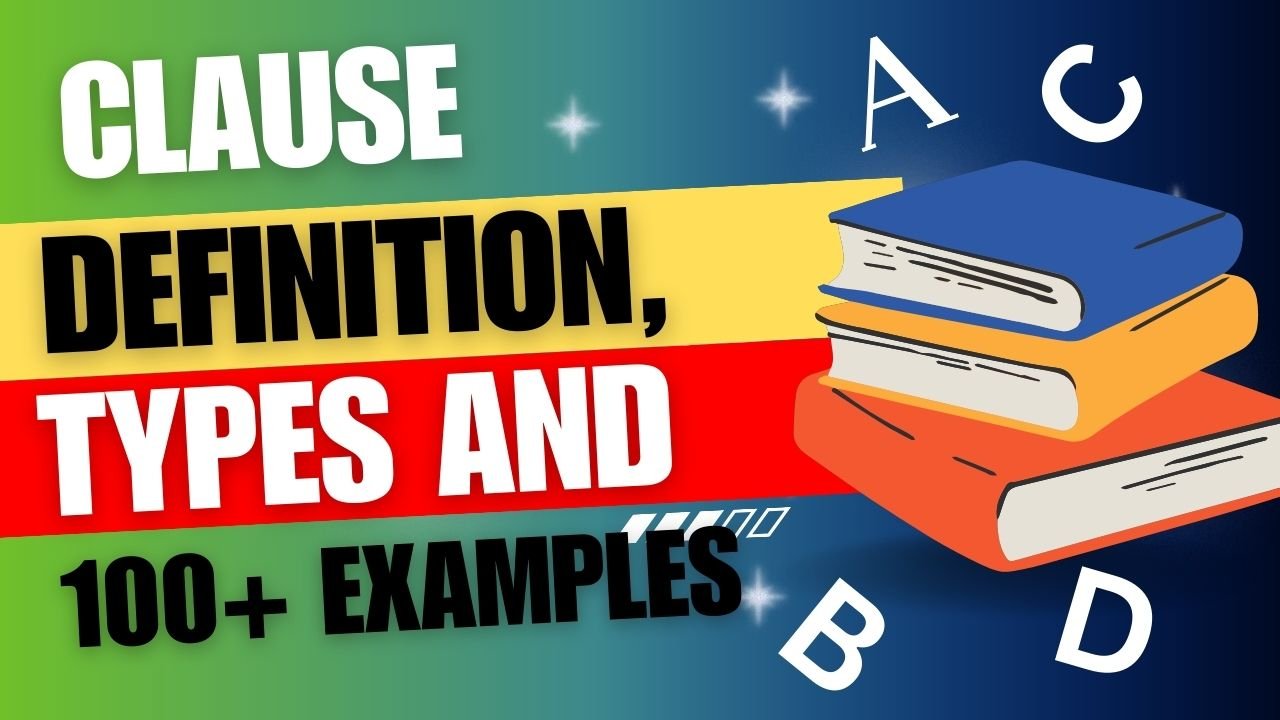A clause is a linguistic construction containing a subject and a predicate. In grammar, a clause is a group of words that includes a subject and a verb (predicate). Clauses can be classified into two main types: independent clauses and dependent clauses.
Definition of a Clause
The definition of a Clause is given below
According to the Cambridge Dictionary
A clause is a group of words, consisting of a subject and a finite form of a verb.
According to the Collins Dictionary
A clause is a group of words containing a verb.
According to the Oxford Learner’s Dictionary
a clause is a group of words that includes a subject and a verb and forms a sentence or part of a sentence.
According to the Merriam-Webster Dictionary
A clause is a group of words containing a subject and predicate and functioning as a member of a complex or compound sentence.
Types of Clauses
- Independent Clause: Also known as a main clause, an independent clause can stand alone as a complete sentence. It expresses a complete thought and contains both a subject and a predicate. Example: “The sun was shining brightly.”
- Dependent Clause: Also known as a subordinate clause, a dependent clause cannot stand alone as a complete sentence. It needs to be attached to an independent clause to form a complete thought. Example: “Because the sun was shining brightly, we decided to go for a picnic.”
In the second example, “Because the sun was shining brightly” is a dependent clause. It relies on the independent clause “we decided to go for a picnic” to convey a complete idea. Clauses are essential building blocks of sentences, and their combination forms the basis for constructing meaningful and grammatically correct sentences.
Independent Clauses
A main clause and independent Clause is a group of words with a subject and a verb. It can stand alone and makes complete sense. That is why it is called an independent clause.
Examples of Independent Clauses
- I know how to drive a car, but I enjoy riding bikes.
- Today is Wednesday.
- I was not keeping well, so I took a day off work.
- When I met you, I did not think we would get this close.
- It was my sister’s birthday yesterday; however, she did not want to celebrate.
Types of Independent Clauses
- Simple Independent Clause:
- Example: “She walked to the store.”
- Compound Independent Clause:
- Example: “She walked to the store, and he rode his bike.”
- Complex Independent Clause:
- Example: “Although it was raining, she walked to the store.”
Dependent Clauses
A subordinate clause and Dependent Clause is a group of words that consists of a subject, a verb, and a subordinating conjunction or a relative pronoun. Unlike main clauses, subordinate clauses cannot stand alone or convey complete meaning when taken separately from the sentence it is a part of. Dependent clauses can be divided into types based on their function. The types of dependent clauses are noun clauses, adjective clauses, adverb clauses, conditional clauses, relative clauses, comparative clauses, verbless clauses, and complementary clauses.
Examples of Dependent Clauses
- After we reached home, we watched a movie.
- Everybody knows the boy who won the Best Outgoing Student Award.
- My mom asked me to call her as soon as I boarded the bus.
- While we were waiting at the bus stop, we saw a monkey snatching a snack from a little boy.
- Though Malcom did not find the movie interesting, he stayed until the end of the movie.
Types of Independent Clauses
- Noun Clause (Functioning as a Subject):
- Example: “What she said made everyone laugh.”
- Noun Clause (Functioning as an Object):
- Example: “I don’t understand why she did that.”
- Adjective Clause:
- Example: “The book that you recommended is excellent.”
- Adverbial Clause of Time:
- Example: “After we finished dinner, we went for a walk.”
- Adverbial Clause of Place:
- Example: “Wherever she goes, she finds a way to help others.”
- Adverbial Clause of Cause and Effect:
- Example: “Because it was raining, we stayed indoors.”
- Adverbial Clause of Condition:
- Example: “If you finish your homework, you can go out.”
Note
- Independent clauses can stand alone as complete sentences, while dependent clauses cannot stand alone and need to be attached to independent clauses.
- Noun clauses function as nouns, adjective clauses modify nouns, and adverbial clauses modify verbs, adjectives, or other adverbs.
- Adverbial clauses can indicate time, place, cause and effect, or condition.
See this also –
- विश्व के प्रमुख समाचार पत्र एवम प्रकाशन स्थल
- चाँद पर उतरने वाले देश | Country that lands on the Moon
- भारत के प्रमुख संस्था, संस्थापक, संस्थान एवं उनके मुख्यालय
- भारत के वित्तीय संस्थान | Financial institutions of India
- महान व्यक्तियों के उपनाम, स्थान, प्रमुख वचन एवं नारे
- Conjunction: Definition, Types, 100+ Example
- Tense: Definition, Types, and 100+ Examples
- Punctuation: Definition, Rules, and 100+ Examples
- UPSSSC PET | Download Syllabus 2023| Exam Pattern| Previous Years Question Paper
- Class 6 History
- Class 6 Civics
- Class 6 Geography
- Class 7 Computer
- Class 8 Computer
- निपात | परिभाषा, प्रकार तथा 50 + उदाहरण

